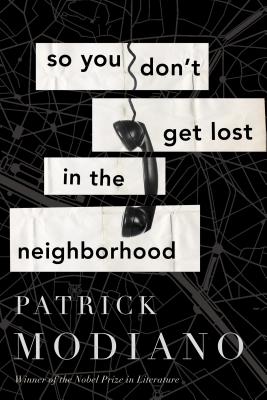 So You Don’t Get Lost in the Neighborhood by Patrick Modiano | Northwest Review of Books
So You Don’t Get Lost in the Neighborhood by Patrick Modiano | Northwest Review of Books
Modiano’s investigation into memory has earned him comparisons with Marcel Proust, but where In Search of Lost Time spends seven volumes comprehensively navigating the narrator’s past, Modiano’s fiction has a more immediate predicament that prompts the scrutiny, a question to be answered. Proust represents contemplative self-reflection, whereas Modiano works with mysteries as metaphors. So You Don’t Get Lost in the Neighborhood, for instance, opens with a quintessentially postmodern situation: Jean Daragane, an aging and isolated novelist, receives a phone call late at night from a man who says he found the writer’s address book. It puts one in mind of Paul Auster’s City of Glass or Haruki Murakami’s The Wind-Up Bird Chronicle, which both open with mysterious phone calls. Modiano, though, plays the plot more realistically than either Auster or Murakami, but that doesn’t mean the conundrums are any less complex or postmodern.
Month: November 2015
 The Ever-Expanding World of David Mitchell | Literary Hub
The Ever-Expanding World of David Mitchell | Literary Hub
But as I read The Bone Clocks, and his latest novel Slade House, I realized that Mitchell now was after something grander and even more ambitious than any of his individual novels: this guy is going to connect all his books. For real. All of his books. And, it seems to me, he’s doing it unlike any other author before him. In his review of Slade House in the New York Times, Dwight Garner writes that, “Mr. Mitchell’s intertextual gamesmanship—the recurring characters and so on—began to seem, as a friend said to me, ‘less like Yoknapatawpha and more like Marvel.’” Garner invokes the comic book publisher pejoratively but I think it’s the reason Mitchell’s enterprise is so unique and captivating. Rather than creating a tapestry of a particular geography, Mitchell is telling one gigantic story, so that with each book the meaning and even the plot of his previous books are amended as he goes.
 An Interview w/ National Book Award-nominee Karen E. Bender | Literary Hub
An Interview w/ National Book Award-nominee Karen E. Bender | Literary Hub
According to herself, Karen E. Bender feels “more natural” as a short story writer, and, according to me, she’s a fantastic one. The stories in her first collection Refund aim directly at their targets, the prose clean and sharp, unobtrusive but startling—in other words, she’s the kind of writer who employs her language in the service of her characters and her situations. Authors of this ilk—Jhumpa Lahiri, Nathan Englander, Antonya Nelson, Rebecca Lee—possess a confidence that may seem undercut by the lack of flash, but make no mistake: it takes a great deal of self-belief and skill to focus on a story’s content (and content that, it should be noted, pursues real human moments rather than histrionic drama) rather than its presentation.
 Roxane Gay Wins PEN Center USA’s Freedom to Write Award | Literary Hub
Roxane Gay Wins PEN Center USA’s Freedom to Write Award | Literary Hub
You may know Roxane for her acclaimed novel An Untamed State or her bestselling essay collection Bad Feminist, or you may know her from the entire Internet. Her timely essays—including her recent, widely read New York Times piece “Where Are Black Children Safe?”—strike a chord with readers with their clear, direct, uncompromising prose, and get shared on social media like the latest comic book movie trailer. On Twitter, her nearly 100,000 followers are among the most engaged on the Internet, quick with a word of support or a declaration of solidarity. She’s appeared on numerous panels and in most major publications. She is, in other words, a true literary star.